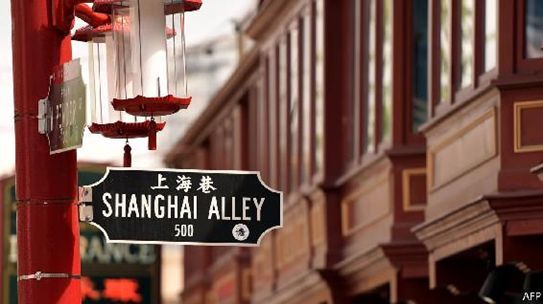The property battle in Vancouver’s Chinatown
Developers have changed the face of Canada’s western metropolis. Chinatown is resisting
Apr 12th 2018 | VANCOUVER
THE smell of incense fills the narrow stairway of the Yue-Shan Society building, a social club for people with roots in Panyu, part of Guangzhou, a city in southern China. Barely audible is the tinking of a ping-pong ball on a table. On the first floor two games of mah-jong are being played, watched by a handful of onlookers. East Pender Street in Vancouver’s Chinatown is home to many such clubs for clans or benevolent associations. Melody Ma, a spectator in her 20s, recalls: “When I was small my grandma would bring me to one of these places.”
The gently sloping streets where Ms Ma grew up have not changed much. Vancouver has had a frantic property market since it hosted the winter Olympics in 2010. The downtown area is forested with new condominiums. Prices have risen by nearly 60% in the past three years, partly because of demand from non-resident Chinese investors. But until recently developers have largely shunned Chinatown. It is part of an area called Downtown Eastside, a district of rundown buildings, methadone clinics and rough sleepers. Many Chinatown residents are old and poor.
Developers now have Chinatown in their sights. Two years ago one built a 17-storey condo on its edge. This alarmed many residents, who had formed a group to halt the high-rise advance, now called #SaveChinatownYVR. Ms Ma is its leader. Recently it has been successful.
onlooker: a person who watches an activity or event without being involved in it
benevolent: organized to do good things for other people
condominium: a room or set of rooms that is owned by the people who live there and that is part of a larger building containing other similar sets of rooms
The main theatre of battle is a car park known as 105 Keefer, where Beedie Living proposes to build a nine-storey brick-and-glass apartment block. The developer promises 111 luxury flats, with rooftop landscaping and shops below.
The patch of tarmac at 105 Keefer is not much to look at. But it is in an area rich with cultural associations, residents say. Just to the south is a monument that commemorates Chinese-Canadian builders of the Canadian Pacific Railway and veterans of the second world war. Across the street is the Sun Yat-sen Classical Chinese Garden and the Chinese Cultural Centre Museum. “A lot of people were appalled” because of the condo’s “proximity to sacred sites in the heart of Chinatown”, says Ms Ma. Some residents also fear that it will push up rents.
Conservationists hope that the parking lot is where they can halt development, which they say has spoilt the charm of other Vancouver neighbourhoods such as Mount Pleasant. The dispute is part of a debate about the city’s identity, says Andy Yan, an urban planner.Vancouverites, he says, are asking themselves,“Who are we? And what are we building for?” The people who might want to buy the flats that do not yet exist are, of course, not being consulted.
appall: to cause someone to feel fear, shock, or disgust
这是一篇关于温哥华老城区中国城的改造新闻,很多传统的东西要维护才能不被摧毁...
--------------------------------------------------------------------------------------------------------------------
Results
Lexile®Measure: 1000L - 1100L
Mean Sentence Length: 13.97
Mean Log Word Frequency: 3.25
Word Count: 447
这篇文章的蓝思值是在1000-1100L, 是经济学人里最低难度的文章~
使用kindle断断续续地读《经济学人》三年,发现从一开始磕磕碰碰到现在比较顺畅地读完,进步很大,推荐购买!点击这里可以去亚马逊官网购买~
